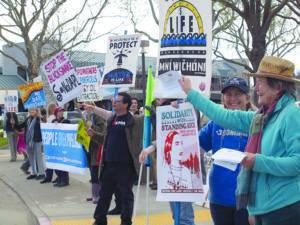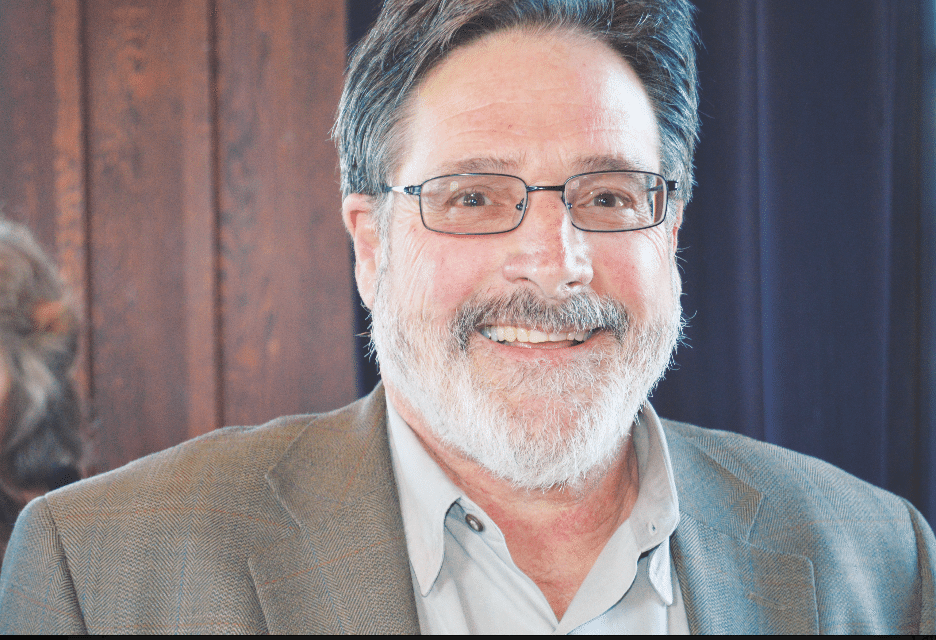By Tom Gogola
Dennis Rodoni, the newly elected Marin County Supervisor for the 4th District, was at an event last week hosted by the West Marin Fund. The nonprofit foundation’s newest advisory-board member, Rodoni talked about the various issues of import to his constituents: Affordable housing, immigration and, of course, parking.
The semi-regular West Marin Fund confab was held at the Dance Palace in Point Reyes Station and featured numerous directors of nonprofits from throughout West Marin representing various constituencies—West Marin Senior Services, Community Land Trust Association of West Marin (CLAM), the Coastal Health Alliance and others—who’d come to hear Rodoni, a long-time local and general contractor who lives in Olema.
Catherine Porter is the founder and executive director of the West Marin Fund, and in her introduction to Rodoni announced that she’d be leaving the fund later this year to make way for a full-time executive director; she currently works part-time and is thinking about a new career move into hospice care. Porter noted that Rodoni has “chaired and represented nearly every organization in the county” as she highlighted his roots in the area, which extend to business, nonprofit and family connections throughout West Marin.
Six weeks into his first term as county supervisor, replacing the departed and popular Steve Kinsey, Rodoni was raspy-voiced but energetic as he took the lectern at the Dance Palace and told the audience that it was always good to come back to the old neighborhood. Rodoni was raised on nearby B Street, he told the crowd, and used to attend church in that very space, back when it was still a Catholic church and not a nonprofit, mixed-use center that’s rented out for bands, community groups and the like.
As Rodoni’s been staffing-up in his new role, he’s also been digging into the issues he faces from the Canal District in San Rafael all the way to tiny Bolinas. One issue that links everyone is immigration, lately in the news because of Trump’s push on throwing out as many undocumented aliens as he can before his inevitable impeachment.
There’s a lot of fear and fear-mongering over immigrants, and the threat of raids from U.S. Immigration and Customs Enforcement (ICE) is palpable among immigration populations around the country, but Rodoni insisted that “ICE has not been in Marin or Sonoma [counties], no matter what you may have heard.” The supervisor says he’s been getting tons of calls from nervous residents, and noted that President Barack Obama had deported some three million undocumented immigrants. “Trump is talking 11 million—and hopefully he won’t be successful.”
The supervisor also insisted that local law enforcement leaders are not going to participate in any immigration roundup enacted under the guise of law enforcement. He’s gotten their word, he said. The county is offering legal aid services to immigrants, and Rodoni also told attendees that the Mexican Consulate in San Francisco is offering legal advice to the undocumented. Locally, Rodoni says, “We are working with the [police] chiefs in San Rafael and Novato and the Sheriff in Marin, and we have a commitment from them that they won’t enforce immigration law, work with ICE, unless there is a violent felony—a warrant for their arrest.” Local law enforcement agencies around the county, he says, “are really concerned about losing the goodwill that they’ve been building for years. Any movement toward working with [ICE] is counterproductive from a law-enforcement point of view.
“Don’t answer your door if you don’t know who it is,” he continued, adding that his office, the Marin Civic Center and area schools “should be a safe space for anyone who feels threatened.”
Immigration and affordable housing are intertwined issues in Marin County, given the agricultural bent of West Marin, and the lack of affordable housing in most of the county, where rents now average $2,000 a month for a two-bedroom.
Rodoni highlighted small-scale efforts that have been undertaken in West Marin, including a San Geronimo takeover of a trailer court, the ongoing effort to transform an old Coast Guard station in Point Reyes into affordable housing and several efforts in the supervisors’ legislative hopper that would, for example, assist landlords when they choose to rent their units at below-market rates. “The efforts may be small, they may be incremental,” Rodoni says, “but it’s important to the people” who wind up in those new units. The idea of getting landlords to rent at below-market rates may be “an unusual concept,” Rodoni said to peals of laughter from the crowd, “but it works for the community.”
And, he said, part of the plan for the Coast Guard station’s transition to housing is to keep one or two units free as transitional housing for locals who might find themselves suddenly uprooted from their rental units. Such efforts can provide stability for local families in a county that doesn’t have a just-cause eviction ordinance, or any form of rent stabilization. The county has rejected efforts at both in the past year. Rodoni says his colleagues are open to a just-cause ordinance—but that in the absence of rent control or stabilization, landlords “can raise the rent until you have to get out anyway.”
The housing issues are different in the eastern and populated part of Rodoni’s district, which includes San Rafael. There, he says, the biggest affordable-housing challenge is in getting landlords to accept vouchers, mostly Section 8 federal housing subsidies—and he cited some movement on that front, as 25 landlords, he says, have signed on to a local housing program and are now accepting the vouchers for the first time.
And then there are those Marin residents who neither rent nor own, but live in their cars or “street-camp” around the county. There are quite a few of them, and many in West Marin. Indeed, as Rodoni gave his talk, a familiar and often-in-motion street-camping white van was parked across the street from the Dance Palace.
Rodoni met recently with Bolinas homeowners on Brighton Avenue who have been complaining about the number of long-term street-campers who have taken up residence along the street, and don’t ever seem to leave. He followed it up with a public meeting at the Bolinas firehouse and spoke to the complexity of the issue at the West Marin Fund confab.
Rodoni says he told the Brighton Avenue homeowners that simply forcing the street-campers off their street won’t solve the housing or aesthetic or resentment problem—they’ll just move elsewhere and park across from someone else’s house. Rodoni suggested that Marin take a page from Santa Rosa, and get the churches involved. That city green-lit a program where churches and good-Samaritan residents are allowed to let people park their cars on their properties.
NEWS BRIEF: SPO Partners Protest
On Friday, February 24, the organization Sonoma Solidarity with Standing Rock descended on SPO Partners in Mill Valley to protest the Dakota Access Pipeline (DAPL) project in South Dakota. As Will Parrish reported recently [‘Pipeline Backers,’ November 30], SPO Partners is a hedge fund with ties to the DAPL project. In a statement, Patrick O’Connell, founder and director of the Civil Resistance Works project in San Rafael, says that organizers picked SPO “because they are the largest investors in Oasis Petroleum, [which] is one of nine

companies supplying oil to DAPL.” On Feb. 24, O’Connell and the Sonoma No Dakota Access Pipeline support group presented a letter to SPO Partners Managing Partner John Scully that charged, “we believe that SPO Partners’ investments in Oasis Petroleum is a criminal act,”—and said that because of the proposed route through sacred Sioux land, that the criminal violation occurred under the so-called “Incitement Offense” of the Genocide Convention Implementation Act of 1987.—Tom Gogola







Thanks for the great article, Tom. Just some background: the West Marin Fund is a community foundation serving and supporting the 11 unincorporated coastal communities of West Marin. One of the services we provide are these ConFabs – free skill-building workshops for the nonprofit leadership of the region. We’re grateful to Dennis for coming out and talking to all of us about the issues that affect West Marin.